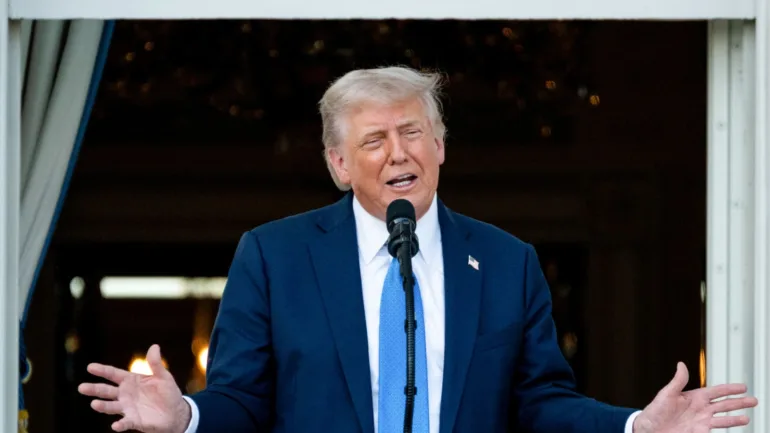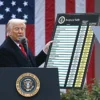U.S. President Donald Trump on Wednesday signed a sweeping new travel ban affecting 19 countries, reviving one of the most contentious policies from his first term. The move follows a makeshift flamethrower attack at a pro-Israel protest in Colorado, which authorities say was carried out by an Egyptian man allegedly in the country illegally.
The new order, signed with little prior notice, bans all travel to the United States for nationals of 12 countries: Afghanistan, Iran, Yemen, Libya, Somalia, Sudan, Myanmar, Chad, Equatorial Guinea, Eritrea, Haiti, and the Republic of the Congo.
A partial ban has also been placed on travelers from seven other countries — Burundi, Cuba, Laos, Sierra Leone, Togo, Turkmenistan, and Venezuela — restricting most travel but allowing limited temporary work visas.
The White House said the new restrictions will take effect on Monday.
“The recent terror attack in Boulder, Colorado has underscored the extreme dangers posed to our country by the entry of foreign nationals who are not properly vetted,” Trump said in a video message from the Oval Office posted on X. “We don’t want them.”
The White House said the bans will not apply to foreign athletes participating in the 2026 FIFA World Cup — which the U.S. will co-host with Canada and Mexico — or the 2028 Los Angeles Olympics.
In a separate announcement Wednesday, Trump also introduced a visa ban on foreign students newly admitted to Harvard University, escalating his ongoing criticism of liberal academic institutions.
The new travel restrictions mirror Trump’s 2017 “Muslim ban,” which triggered widespread protests and legal challenges. Trump credited that policy with preventing terror attacks on American soil similar to those seen in Europe.
“We will not let what happened in Europe happen in America,” he said. “We cannot have open migration from any country where we cannot safely and reliably vet and screen.”
Backlash and legal threats
Venezuela, one of the countries affected by the partial ban, swiftly condemned the move.
“Being in the United States is a great risk for anyone, not just for Venezuelans,” said Interior Minister Diosdado Cabello, warning citizens against traveling to the U.S.
Trump’s latest ban is expected to face legal pushback, much like previous executive orders during his presidency. The announcement was made without a formal press briefing and came minutes after Trump addressed political appointees at a celebratory White House event.
Speculation about a new travel ban had intensified after the Colorado attack, which injured several people attending a rally in support of Israeli hostages held by Hamas.
Court documents name the suspect as Mohammed Sabry Soliman, an Egyptian national who allegedly threw firebombs and sprayed burning gasoline on the crowd. Homeland Security officials said Soliman had overstayed a tourist visa and filed for asylum in September 2022.
Despite Egypt being the suspect’s country of origin, it was notably absent from the list of banned nations.
White House Deputy Press Secretary Abigail Jackson said the measure fulfills Trump’s campaign promise to shield Americans from “dangerous foreign actors.”
“President Trump is fulfilling his promise to protect Americans from dangerous foreign actors that want to come to our country and cause us harm,” Jackson said on X.
Reasons for inclusion
Trump’s proclamation detailed specific justifications for each country included in the ban. For conflict-ridden or autocratic states like Afghanistan, Libya, Sudan, Somalia, and Yemen, the administration cited the absence of reliable government institutions to issue and verify travel documents.
Iran was designated a state sponsor of terrorism, while other countries were flagged for high rates of visa overstays and weak information-sharing with U.S. authorities.
Critics were quick to highlight the human impact of the ban. Jamal Abdi, president of the National Iranian American Council, said it would once again isolate Americans from loved ones abroad.
“The impact of the ban will once again be felt by Americans who are denied the ability to see their loved ones at weddings, funerals, or the birth of a child,” Abdi said.
The new order marks one of Trump’s boldest immigration actions since returning to office and is likely to spark significant domestic and international backlash.
AFP


